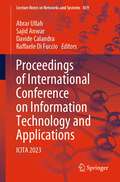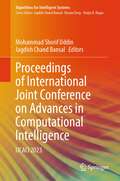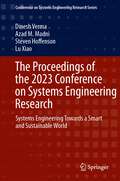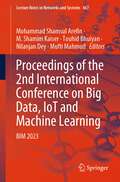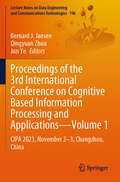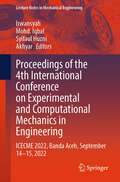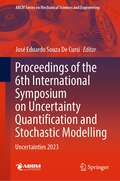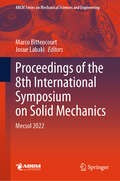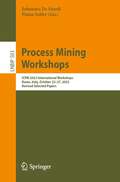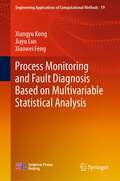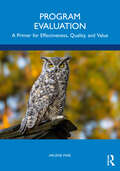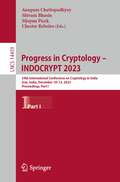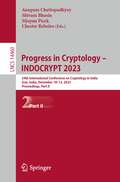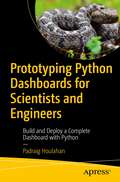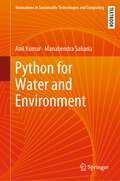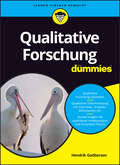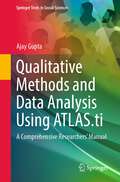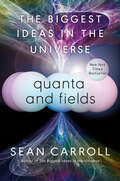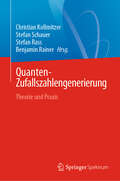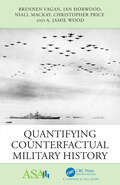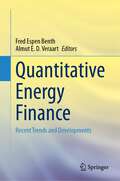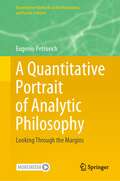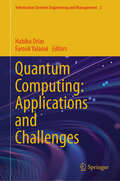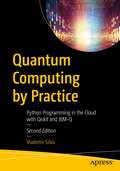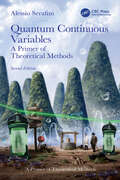- Table View
- List View
Proceedings of International Conference on Information Technology and Applications: ICITA 2023 (Lecture Notes in Networks and Systems #839)
by Abrar Ullah Sajid Anwar Davide Calandra Raffaele Di FuccioThis book includes high-quality papers presented at 17th International Conference on Information Technology and Applications (ICITA 2023), held in Turin, Italy during 20 – –22 October 2023. The book presents original research work of academics and industry professionals to exchange their knowledge of the state-of-the-art research and development in information technology and applications. The topics covered in the book are cloud computing, business process engineering, machine learning, evolutionary computing, big data analytics, internet of things and cyber-physical systems, information and knowledge management, computer vision and image processing, computer graphics and games programming, mobile computing, ontology engineering, software and systems modelling, human computer interaction, online learning /e-learning, computer networks, and web engineering.
Proceedings of International Joint Conference on Advances in Computational Intelligence: IJCACI 2023 (Algorithms for Intelligent Systems)
by Mohammad Shorif Uddin Jagdish Chand BansalThis book gathers outstanding research papers presented at the 7th International Joint Conference on Advances in Computational Intelligence (IJCACI 2023), held in hybrid mode at South Asian University, New Delhi, India during October 14–15, 2023. IJCACI 2023 is jointly organized by Jahangirnagar University (JU), Bangladesh and South Asian University (SAU), India. The book presents the novel contributions in areas of computational intelligence and it serves as a reference material for advance research. The topics covered are collective intelligence, soft computing, optimization, cloud computing, machine learning, intelligent software, robotics, data science, data security, big data analytics, and signal and natural language processing.
The Proceedings of the 2023 Conference on Systems Engineering Research: Systems Engineering Towards a Smart and Sustainable World (Conference on Systems Engineering Research Series)
by Dinesh Verma Azad M. Madni Steven Hoffenson Lu XiaoThe 20th International Conference on Systems Engineering Research (CSER 2023) pushes the boundaries of systems engineering research and responds to new challenges for systems engineering. CSER 2023 invited researchers and practitioners to submit their work in alignment with the thematic focus on a smart and sustainable world. CSER was founded in 2003 by Stevens Institute of Technology and the University of Southern California, and in 2023 the conference returned to the Stevens campus in Hoboken, New Jersey.
Proceedings of the 2nd International Conference on Big Data, IoT and Machine Learning: BIM 2023 (Lecture Notes in Networks and Systems #867)
by Mohammad Shamsul Arefin M. Shamim Kaiser Touhid Bhuiyan Nilanjan Dey Mufti MahmudThis book gathers a collection of high-quality peer-reviewed research papers presented at the International Conference on Big Data, IoT and Machine Learning (BIM 2023), organised by Jahangirnagar University, Bangladesh, and Daffodil International University, Bangladesh, held in Dhaka, Bangladesh, during 6–8 September 2023. The book covers research papers in the field of big data, IoT and machine learning. The book is helpful for active researchers and practitioners in the field.
Proceedings of the 3rd International Conference on Cognitive Based Information Processing and Applications–Volume 1: CIPA 2023, November 2–3, Changzhou, China (Lecture Notes on Data Engineering and Communications Technologies #196)
by Jun Ye Bernard J. Jansen Qingyuan ZhouThis book contains papers presented at the 3rd International Conference on Cognitive- based Information Processing and Applications (CIPA) in Changzhou, China, from November 2–3, 2023. The papers represent the various technological advancements in theory, technology and application of artificial intelligence, including precision mining, intelligent computing, deep learning, and all other theories, models, and technologies related to artificial intelligence. It caters to postgraduate students, researchers, and practitioners specializing and working in the area of cognitive-inspired computing and intelligent computing. The book represents Volume 1 for this conference proceedings, which consists of a 3-volume book series.
Proceedings of the 4th International Conference on Experimental and Computational Mechanics in Engineering: ICECME 2022, Banda Aceh, September 14–15, 2022 (Lecture Notes in Mechanical Engineering)
by Irwansyah Mohd. Iqbal Syifaul Huzni AkhyarThis book gathers a selection of peer-reviewed papers presented at the 4th International Conference on Experimental and Computational Mechanics in Engineering (ICECME 2022), held as a virtual conference and organized by Universitas Syiah Kuala, Banda Aceh, Indonesia, on September 14–15, 2022.This book, prepared by international scientists and engineers, covers the latest advances in computational mechanics, metallurgy and material science, energy systems, manufacturing processing systems, industrial and system engineering, biomechanics, artificial intelligence, micro-/nano-engineering, micro-electro-mechanical system, machine learning, mechatronics, and engineering design. This book is intended for academics, including graduate students and researchers, as well as industrial practitioners working in the areas of experimental and computational mechanics.
Proceedings of the 6th International Symposium on Uncertainty Quantification and Stochastic Modelling: Uncertainties 2023 (Lecture Notes in Mechanical Engineering)
by José Eduardo Souza De CursiThis proceedings book covers a wide range of topics related to uncertainty analysis and its application in various fields of engineering and science. It explores uncertainties in numerical simulations for soil liquefaction potential, the toughness properties of construction materials, experimental tests on cyclic liquefaction potential, and the estimation of geotechnical engineering properties for aerogenerator foundation design. Additionally, the book delves into uncertainties in concrete compressive strength, bio-inspired shape optimization using isogeometric analysis, stochastic damping in rotordynamics, and the hygro-thermal properties of raw earth building materials. It also addresses dynamic analysis with uncertainties in structural parameters, reliability-based design optimization of steel frames, and calibration methods for models with dependent parameters. The book further explores mechanical property characterization in 3D printing, stochastic analysis in computational simulations, probability distribution in branching processes, data assimilation in ocean circulation modeling, uncertainty quantification in climate prediction, and applications of uncertainty quantification in decision problems and disaster management. This comprehensive collection provides insights into the challenges and solutions related to uncertainty in various scientific and engineering contexts.
Proceedings of the 8th International Symposium on Solid Mechanics: Mecsol 2022 (Lecture Notes in Mechanical Engineering)
by Marco Bittencourt Josue LabakiThis book presents the proceedings of Mecsol 2022. The papers cover multidisciplinary topics, including Fatigue and Failure Analyses; Composite Materials and Structures; Elasticity, Plasticity, Damage and Fracture Mechanics; Viscoelasticity and Viscoplasticity; Impact Engineering; Structural Reliability Methods and Reliability-Based Design Optimization; Optimization of Materials, Fluids and Structures; Numerical Methods; Nonlinear Analyses; High-Performance Computing applied to Solid Mechanics; and Artificial Intelligence- and Neural Network-supported applications.
Process Mining Workshops: ICPM 2023 International Workshops, Rome, Italy, October 23–27, 2023, Revised Selected Papers (Lecture Notes in Business Information Processing #503)
by Johannes De Smedt Pnina SofferThis volume constitutes the revised selected papers of several workshops which were held in conjunction with the 5th International Conference on Process Mining, ICPM 2023, held in Rome, Italy, in October 23–27, 2023.The 38 revised full papers presented in this book were carefully reviewed and selected from 85 submissions. The book also contains one invited talk. ICPM 2023 presented the following six workshops:– 4th International Workshop on Event Data and Behavioral Analytics (EdbA)– 4th International Workshop on Leveraging Machine Learning in Process Mining (ML4PM)– 6th International Workshop on Process-Oriented Data Science for Healthcare (PODS4H)– 8th International Workshop on Process Querying, Manipulation, and Intelligence (PQMI)– 2nd International Workshop on Education Meets Process Mining (EduPM)– 2nd International Workshop on Collaboration Mining for Distributed Systems (COMINDS).
Process Monitoring and Fault Diagnosis Based on Multivariable Statistical Analysis (Engineering Applications of Computational Methods #19)
by Xiangyu Kong Jiayu Luo Xiaowei FengThis book reports the developments of the Total Least Square (TLS) algorithms for parameter estimation and adaptive filtering. Specifically, this book introduces the authors’ latest achievements in the past 20 years, including the recursive TLS algorithms, the approximate inverse power iteration TLS algorithm, the neural based MCA algorithm, the neural based SVD algorithm, the neural based TLS algorithm, the TLS algorithms under non-Gaussian noises, performance analysis methods of TLS algorithms, etc. In order to faster the understanding and mastering of the new methods provided by this book for readers, before presenting each new method in each chapter, a specialized section is provided to review the closely related several basis models. Throughout the book, large of procedure of new methods are provided, and all new algorithms or methods proposed by us are tested and verified by numerical simulations or actual engineering applications. Readers will find illustrative demonstration examples on a range of industrial processes to study. Readers will find out the present deficiency and recent developments of the TLS parameter estimation fields, and learn from the the authors’ latest achievements or new methods around the practical industrial needs. In my opinion, this book can be assimilated by advanced undergraduates and graduate (PH.D.) students, as well as statisticians, because of the new tools in data analysis, applied mathematics experts, because of the novel theories and techniques that we propose, engineers, above all for the applications in control, system identification, computer vision, and signal processing.
Program Evaluation: A Primer for Effectiveness, Quality, and Value
by Arlene FinkThis timely, unique, and insightful book provides students and practitioners with the tools and skills needed to evaluate social and policy programs across a range of disciplines—from public health to social work to education—enabling the allocation of scarce human and financial resources to advance the health and well-being of individuals and populations. The chapters are organized according to the main tasks involved in conducting an evaluation to produce unbiased evidence of program effectiveness, quality, and value. The chapters include methods for selecting and justifying evaluation questions or hypotheses, designing evaluations, sampling participants, selecting information sources, and ensuring reliable and valid measurement. The final section of the book is focused around managing and analyzing data and transparently reporting the results in written and oral form. The book features international case studies throughout, covers quantitative, qualitative, and mixed-method approaches, and is also informed by new online methods developed during the COVID-19 pandemic. Among the book’s unique features is a focus on international standards for conducting ethical evaluations and avoiding research misconduct. Also featuring checklists, example forms, and summaries of the key ideas and topics, this very practical book is essential reading for students in the social, behavioral, and health sciences, and will be a key resource for professionals in the field.
Progress in Cryptology – INDOCRYPT 2023: 24th International Conference on Cryptology in India, Goa, India, December 10–13, 2023, Proceedings, Part I (Lecture Notes in Computer Science #14459)
by Anupam Chattopadhyay Shivam Bhasin Stjepan Picek Chester RebeiroThe two-volume proceedings constitutes the refereed proceedings of the 24th International Conference on Progress in Cryptology, INDOCRYPT 2023, Goa, India, in December 2023. The 26 full papers were carefully reviewed and selected from 74 submissions. They are organized in topical sections as follows: Part One: Symmetric-key cryptography, Hash functions, Authenticated Encryption Modes; Elliptic curves, Zero-knowledge proof, Signatures; Attacks.Part Two: Secure computation, Algorithm hardness, Privacy; Post-quantum cryptography.
Progress in Cryptology – INDOCRYPT 2023: 24th International Conference on Cryptology in India, Goa, India, December 10–13, 2023, Proceedings, Part II (Lecture Notes in Computer Science #14460)
by Anupam Chattopadhyay Shivam Bhasin Stjepan Picek Chester RebeiroThe two-volume proceedings constitutes the refereed proceedings of the 24th International Conference on Progress in Cryptology, INDOCRYPT 2023, Goa, India, in December 2023. The 26 full papers were carefully reviewed and selected from 74 submissions. They are organized in topical sections as follows: Part One: Symmetric-key cryptography, Hash functions, Authenticated Encryption Modes; Elliptic curves, Zero-knowledge proof, Signatures; Attacks. Part Two: Secure computation, Algorithm hardness, Privacy; Post-quantum cryptography.
Prototyping Python Dashboards for Scientists and Engineers: Build and Deploy a Complete Dashboard with Python
by Padraig HoulahanCreate interactive and data-driven dashboards using Python. This hands-on guide is a practical resource for those (with modest programming skills) in scientific and engineering fields looking to leverage Python's power for data visualization and analysis in a user-friendly dashboard format. You’ll begin by gaining a fundamental understanding of Python programming, including data types, lists, dictionaries, and data structures. The book then delves into the world of reactive programming with Plotly and Dash, offering a hands-on approach to building interactive web-based dashboards. Next, you’ll see how to work with online data, how to scrape and clean datasets, and keep files up-to-date. The book also guides you through planning a dashboard prototype, outlining project tasks, trends, forecasts, spectra, and other design considerations. It concludes with a discussion of how the dashboard can be used for data visualization of real data, explaining the usefulness of tools such as spectra. By providing detailed examples for download and customization, Prototyping Python Dashboards for Scientists and Engineers will equip you with the skills needed to jumpstart your own development efforts. What You’ll Learn Design a dashboard with PythonConvert and filter Excel formatted files to produce CSV filesCreate browser-served graphics with PLOTLYGenerate polynomial trend lines for forecastingBuild a Unix service to share your dashboard Who This Book Is For Scientists, engineers, students, programmers, and data enthusiasts who aspire to harness Python's potential for data visualization and analysis through the creation of interactive dashboards. Many will be pragmatic programmers with modest skills and limited resources who mainly want to see a working solution they could emulate.
Python for Water and Environment (Innovations in Sustainable Technologies and Computing)
by Anil Kumar Manabendra SahariaThis textbook delves into the practical applications of surface and groundwater hydrology, as well as the environment. The Part I, "Practical Python for a Water and Environment Professional," guides readers through setting up a scientific computing environment and conducting exploratory data analysis and visualization using reproducible workflows. The Part II, "Statistical Modeling in Hydrology," covers regression models, time series analysis, and common hypothesis testing. The Part III, "Surface and Subsurface Water," illustrates the use of Python in understanding key concepts related to seepage, groundwater, and surface water flows. Lastly, the Part IV, "Environmental Applications," demonstrates the application of Python in the study of various contaminant transport phenomena.
Qualitative Forschung für Dummies (Für Dummies)
by Hendrik GodbersenSo werden aus Worten Daten Sie wollen bei einer Untersuchung mehr über Motive und Anliegen der zu untersuchenden Gruppe wissen? Dann helfen Ihnen die Methoden der qualitativen Forschung weiter. Hendrik Godbersen erklärt Ihnen von der Pike auf, was Sie über qualitative Forschung wissen müssen, um selbst eine Untersuchung vorzunehmen. Er erläutert dabei den qualitativen Forschungsansatz, Ziele und Designs sowie die Gütekriterien. Außerdem vermittelt er Ihnen, wie Sie Forschungsarbeiten strukturieren, Daten erheben und auswerten und zuletzt die Ergebnisse interpretieren. So wird Ihre Untersuchung gewiss ein Erfolg. Sie erfahren Wie Sie Interviews führen und Gruppendiskussionen leiten Wie Sie qualitative Daten aufzeichnen und transkribieren Wie Sie die richtige Methode für die Datenauswertung nutzen Wie Sie die Qualität Ihrer Untersuchung sichern
Qualitative Methods and Data Analysis Using ATLAS.ti: A Comprehensive Researchers’ Manual (Springer Texts in Social Sciences)
by Ajay GuptaThis book provides an in-depth roadmap for qualitative research methods and data analysis across disciplines using ATLAS.ti. It encompasses and rationalizes key qualitative research concepts and methods with innovative frameworks to enrich the reader’s understanding of qualitative research methods and data analysis. The book contains multiple real-world projects that assist readers in developing conceptual and theoretical knowledge, as well as gaining insights from fieldwork, visualizing data collection, analysis, and methodological interpretations.This easy to use book provides a pragmatic approach to qualitative methods, proficiency in capturing field observations, user-friendly steps to data analysis starting from transcription, preparation of data, reading and identification of quotations, coding, memoing, commenting, code groups, creating smart codes and groups using set, semantic, and proximity operators resulting in generating numerous insightful thematic reports in a variety of formats.More notable features:- Demonstrates systematic roots to research from begin to end- Provides practical advice on how to overcome field challenges during data collection, ethical considerations, and step-by-step procedures for gaining access to participants and capturing holistic data- Includes numerous numerical arguments, interpretations, and explanations for concepts, themes, variables, networks, and emerging concepts- Includes several research frameworks and data analysis guideposts on real-world research projects with thorough procedures covering 267 images and 38 tables- Compelling for quantitative research and mixed methods approachesThe book's straightforward and user-friendly format makes it simple and easy to use, comprehend, and interpret for anyone working with ATLAS.ti.
Quanta and Fields: The Biggest Ideas in the Universe
by Sean CarrollQuanta and Fields, the second book of Sean Carroll&’s already internationally acclaimed series The Biggest Ideas in the Universe, is an adventure into the bare stuff of reality. Sean Carroll is creating a profoundly new approach to sharing physics with a broad audience, one that goes beyond analogies to show how physicists really think. He cuts to the bare mathematical essence of our most profound theories, explaining every step in a uniquely accessible way. Quantum field theory is how modern physics describes nature at its most profound level. Starting with the basics of quantum mechanics itself, Sean Carroll explains measurement and entanglement before explaining how the world is really made of fields. You will finally understand why matter is solid, why there is antimatter, where the sizes of atoms come from, and why the predictions of quantum field theory are so spectacularly successful. Fundamental ideas like spin, symmetry, Feynman diagrams, and the Higgs mechanism are explained for real, not just through amusing stories. Beyond Newton, beyond Einstein, and all the intuitive notions that have guided homo sapiens for millennia, this book is a journey to a once unimaginable truth about what our universe is.
Quanten-Zufallszahlengenerierung: Theorie und Praxis
by Stefan Rass Stefan Schauer Christian Kollmitzer Benjamin RainerDieses Buch bietet einen Überblick über die neuesten Implementierungen von Quanten-Zufallszahlengeneratoren (QRNGs) und untersucht insbesondere deren Beziehung zu klassischen statistischen Zufallsmodellen und numerischen Techniken zur Berechnung von Zufallszahlen. Der Leser - der idealerweise einen Hintergrund in klassischer Statistik, Informatik oder Kryptographie hat - wird Schritt für Schritt in die Welt der Quantenbits eingeführt, und es werden explizite Beziehungen zwischen QRNGs und ihren klassischen Gegenstücken aufgezeigt. Die Erzeugung von Zufallszahlen ist eine wichtige Säule der Kryptographie. Die Nutzung des Zufalls, der Quantenphänomenen innewohnt, ist ein sich rasch entwickelnder Zweig der Quantenkryptografie mit unzähligen Anwendungen für die Zukunft. Der Wert der Quantenzufälligkeit für kryptografische Zwecke wird empirisch durch statistische Auswertungen der Leistung von QRNGs im Vergleich zu klassischen Techniken zur Erzeugung echter und pseudozufälliger Zahlen nachgewiesen. Das Buch bietet dann einen Überblick über die technischen Implementierungen von QRNGs, bevor eine abschließende Diskussion über die wichtigsten Errungenschaften und verbleibenden Hindernisse auf diesem Gebiet die Berichterstattung abrundet und gleichzeitig die Tür für zukünftige Forschungsrichtungen öffnet.
Quantifying Counterfactual Military History (ASA-CRC Series on Statistical Reasoning in Science and Society)
by Brennen Fagan Ian Horwood Niall MacKay Christopher Price A. Jamie WoodForces shaping human history are complex, but the course of history is undeniably changed on many occasions by conscious acts. These may be premeditated or responsive, calmly calculated or performed under great pressure. They may also be successful or catastrophic, but how are historians to make such judgements and appeal to evidence in support of their conclusions? Further, and crucially, how exactly are we to distinguish probable unrealized alternatives from improbable ones? This book describes some of the modern statistical techniques that can begin to answer this question, as well as some of the difficulties in doing so. Using simple, wellquantified cases drawn from military history, we claim that statistics can now help us to navigate the near-truths, the envelope around the events with which any meaningful historical analysis must deal, and to quantify the basis of such analysis. Quantifying Counterfactual Military History is intended for a general audience who are interested in learning more about statistical methods both in military history and for wider applications. Key Features: This book demonstrates how modern statistical techniques can measure the impact of counterfactual decisions. It examines the importance of counterfactual reasoning for both modern scholars and historical actors. It combines historical narrative, mathematical precision and data to create a straightforward presentation of both factual and counterfactual military history. It provides an original contribution to the debate over the validity and rigour of works of counterfactual history. It is written in a manner accessible to readers who have no formal training in History or Statistics.
Quantitative Energy Finance: Recent Trends and Developments
by Fred Espen Benth Almut E. D. VeraartPower markets are undergoing a major transformation from gas and oil-fueled generation toward renewable electricity production from wind and solar sources. Simultaneously, there is an increasing demand for electrification, coupled with long-term climate-induced weather changes. The uncertainties confronting energy market participants require sophisticated modelling techniques to effectively understand risk, many of which are covered in this book.Comprising invited papers by high-profile researchers, this volume examines the empirical aspects of forward and futures prices, uncovering patterns of noise factors in various European electricity markets. Additionally, it delves into the recent, influential classes of Hawkes and trawl processes, emphasizing their significance in energy markets. The impact of renewables on energy market prices is a pivotal concern for both producers and consumers. Mean-field games provide a powerful mathematical framework for this, and a dedicated chapter outlining their dynamics is included in the book. The book also explores structural financial products and their connection to climate risk as a risk management tool, underscoring the essential need for a comprehensive understanding of these products in the realm of "green finance," to which the energy industry is integral. Lastly, the book thoroughly analyzes spatial smoothing and power purchase (PPA) contracts, addressing central issues in energy system planning and financial operations.Tailored for researchers, PhD students, and industry energy analysts, this volume equips readers with insights and tools to navigate the constantly evolving energy market landscape. It serves as a sequel to the earlier Quantitative Energy Finance book, featuring all-new chapters.
A Quantitative Portrait of Analytic Philosophy: Looking Through the Margins (Quantitative Methods in the Humanities and Social Sciences)
by Eugenio PetrovichThis book offers an unprecedented quantitative portrait of analytic philosophy focusing on two seemingly marginal features of philosophical texts: citations and acknowledgements in academic publications. Originating from a little network of philosophers based in Oxford, Cambridge, and Vienna, analytic philosophy has become during the Twentieth century a thriving philosophical community with thousands of members worldwide. Leveraging the most advanced techniques from bibliometrics, citations and acknowledgments are used in this book to shed light on both the epistemology and the sociology of this philosophical field, illuminating the intellectual trajectory of analytic philosophy as well as the social characteristics of the analytic community. Special attention is dedicated to the last forty years, providing insights into a phase of analytic philosophy which is still understudied by historians of philosophy. In the eight chapters of the book, readers will find not only numerous quantitative investigations and technical explanations, but also a robust theoretical framework and epistemological reflections on the strengths and limitations of quantitative methods for the study of philosophy. With its strong interdisciplinary appeal, this book will engage a wide range of scholars, including historians of philosophy seeking new methodologies, analytic philosophers interested in a new look at their discipline, and scholars in digital humanities, bibliometrics, and quantitative studies of science, who will find many innovative techniques for investigating disciplinary fields.
Quantum Computing: Applications and Challenges (Information Systems Engineering and Management #2)
by Farouk Yalaoui Habiba DriasThis book is intended for academics, researchers, Ph.D. students, and industrials to learn about quantum computing and prepare them to understand the future with its cutting-edge tools. Quantum computing holds great promise in terms of human life quality especially when combined with artificial intelligence. In addition to quantum computing, the book focuses on quantum artificial intelligence, quantum machine and deep learning, quantum cryptography, and quantum logistics optimization. Applications in weather forecasting, digital soil mapping, skin lesion classification, combinatorial optimization, and urgent transportation, among others, are presented.
Quantum Computing by Practice: Python Programming in the Cloud with Qiskit and IBM-Q
by Vladimir SilvaLearn to write algorithms and program in the new field of quantum computing. This second edition is updated to equip you with the latest knowledge and tools needed to be a complex problem-solver in this ever-evolving landscape. The book has expanded its coverage of current and future advancements and investments by IT companies in this emerging technology. Most chapters are thoroughly revised to incorporate the latest updates to IBM Quantum's systems and offerings, such as improved algorithms, integrating hardware advancements, software enhancements, bug fixes, and more. You’ll examine quantum computing in the cloud and run experiments there on a real quantum device. Along the way you’ll cover game theory with the Magic Square, an example of quantum pseudo-telepathy. You’ll also learn to write code using QISKit, Python SDK, and other APIs such as QASM and execute it against simulators (local or remote) or a real quantum computer. Then peek inside the inner workings of the Bell states for entanglement, Grover’s algorithm for linear search, Shor’s algorithm for integer factorization, and other algorithms in the fields of optimization, and more. Finally, you’ll learn the current quantum algorithms for entanglement, random number generation, linear search, integer factorization, and others. By the end of this book, you’ll understand how quantum computing provides massive parallelism and significant computational speedups over classical computersWhat You'll LearnWrite algorithms that provide superior performance over their classical counterpartsCreate a quantum number generator: the quintessential coin flip with a quantum twistExamine the quantum algorithms in use today for random number generation, linear search, and moreDiscover quantum teleportationHandle the counterfeit coin problem, a classic puzzle Put your knowledge to the test with more than 150 practice exercises Who This Book Is ForDevelopers, programmers, computer science researchers, teachers, and students.
Quantum Continuous Variables: A Primer of Theoretical Methods
by Alessio SerafiniQuantum Continuous Variables introduces the theory of continuous variable quantum systems, from its foundations based on the framework of Gaussian states to modern developments, including its applications to quantum information and forthcoming quantum technologies. This book addresses the theory of Gaussian states, operations, and dynamics in great depth and breadth, through a novel approach that embraces both the Hilbert space and phase descriptions.The second edition of this book has been revised throughout, and updated to include new topics, such as boson sampling, coherent feedback, nonlinear control, as well as several new solved problems.The volume includes coverage of entanglement theory and quantum information protocols, and their connection with relevant experimental set-ups. General techniques for non-Gaussian manipulations also emerge as the treatment unfolds and are demonstrated with specific case studies.This book will be of interest to graduate students looking to familiarise themselves with the field, in addition to experienced researchers eager to enhance their understanding of its theoretical methods. It will also appeal to experimentalists searching for a rigorous but accessible treatment of the theory in the area.Features Provides the first systematic graduate-level textbook for the field of quantum continuous variables and includes 77 problems for the reader, with accompanying solutions Explores applications to entanglement theory, nonlocality, quantum technologies and quantum control Describes, in detail, a comprehensive list of experimental platforms where the formalism applies Alessio Serafini earned his PhD from the University of Salerno. He is currently a Professor at University College London. His research focuses mainly on quantum optics, quantum information with continuous variables, and the theory of quantum control.
